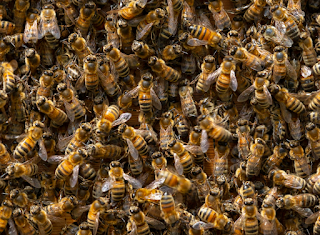STOSSEL: Scaremongering about a ‘bee-pocalypse’
In recent years, headlines have warned of a looming "bee-pocalypse" threatening our food supply and ecosystems. Terms like "bee-mageddon" stir public fear, suggesting catastrophic outcomes if honeybee populations decline. However, this narrative might be more hype than reality.
The Bee Crisis and Media Hysteria
Around 20 years ago, American beekeepers faced a mysterious crisis known as colony collapse disorder (CCD). Hives were suddenly empty, with bees vanishing without a trace. While the exact cause of CCD remains unknown, the media seized on the story, projecting it as an impending environmental disaster.
Despite these alarming reports, the situation has improved significantly. Beekeepers adapted by splitting surviving colonies to create new hives, leading to a rebound in bee populations. "We're not in any way facing an apocalypse," says Jon Entine, a Science journalist and director of the Genetic Literacy Project. Entine points out that bee numbers have never been better.
Misinformation and Public Fear
Stossel criticizes ongoing media reports that continue to spread fear about bee declines. He argues that a simple search would reveal rising bee populations, yet scare stories persist. Sensational headlines, he suggests, drive traffic and donations for environmental groups, even when the underlying facts have changed.
The Role of Pesticides and GMOs
Environmental activists have campaigned against the use of industrial chemicals and genetically modified organisms (GMOs), often citing their potential harm to bees and other wildlife. For example, the European Union banned neonicotinoids, a common insecticide, over fears they could harm bees. However, Entine argues that such bans force farmers to use older, more dangerous chemicals.
Moreover, GMOs offer significant benefits by creating crops that are more resistant to pests and diseases, reducing the need for chemical pesticides. In Bangladesh, a GMO eggplant reduced chemical use by 85%, improving the lives of small farmers, particularly women and children.
Rethinking Environmental Narratives
Stossel suggests that the current environmental narrative is outdated and fails to acknowledge technological advancements that make agriculture safer and more efficient. He argues that fear-mongering about bees and pesticides distracts from the real progress being made in sustainable farming practices.
Conclusion
While concerns about bee health and environmental sustainability are valid, it's essential to base these concerns on accurate, up-to-date information. By acknowledging the resilience of bee populations and the benefits of modern agricultural practices, we can better focus our efforts on genuine environmental challenges.
John Stossel argues that the media's portrayal of a "bee-pocalypse" is exaggerated. While colony collapse disorder caused significant bee losses 20 years ago, bee populations have since rebounded. Stossel criticizes the media for continuing to spread alarmist narratives, despite evidence to the contrary. He highlights that beekeepers have adapted and that modern agriculture, including the use of certain chemicals and GMOs, is often safer and more efficient than portrayed. Stossel suggests that the fear-mongering serves the financial interests of environmental groups rather than reflecting scientific reality.
FAQs
What is colony collapse disorder? Colony collapse disorder (CCD) is a phenomenon where a significant number of worker bees in a colony disappear, leaving behind a queen and a few nurse bees. It caused considerable bee losses about 20 years ago.
Is the bee population still declining? No, bee populations have rebounded significantly as beekeepers have adapted by dividing remaining colonies to create new hives.
Why does Stossel criticize the media’s portrayal of bee population issues? Stossel believes the media exaggerates the issue to generate clicks and donations for environmental organizations, ignoring evidence that bee populations are recovering.
What are noenicitinoids and why are they controversial? Neonicotinoids are a class of insecticides that have been restricted in some regions, like the EU, due to concerns about their impact on bees. Critics argue this leads to the use of older, more harmful chemicals.
How do GMOs benefit agriculture according to Stossel? Stossel argues that GMOs help produce more food on less land, create plants resistant to pests and diseases, and reduce the need for pesticides, which benefits farmers and consumers, especially in poorer regions.
- #BeeConservation
- #SustainableAgriculture
- #EnvironmentalScience
- #GMO
- #Pesticides

